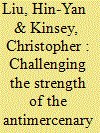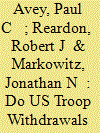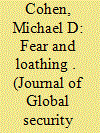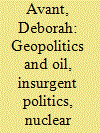|
|
|
Sort Order |
|
|
|
Items / Page
|
|
|
|
|
|
|
| Srl | Item |
| 1 |
ID:
157849


|
|
|
|
|
| Summary/Abstract |
Despite the long standing “no concessions” argument, scientific studies now suggest that governments can benefit from negotiating with militant insurgencies. However, despite government efforts, the leaders of insurgent movements often appear fanatical and unwilling to negotiate. This behavior presents a puzzle: If the leaders of insurgencies mobilize to create political change, and a government offers concessions, why do insurgent leaders refuse to negotiate? Using a game-theoretic model, we argue that insurgent leaders may rationally reject negotiation due to an internal commitment problem. Specifically, when leaders cannot credibly share the benefits of peace with their rivals, insurgent leaders may reject offers over fear of an internal conflict, which could leave the entire group vulnerable to government exploitation. However, the model demonstrates that insurgent leaders should negotiate if power in the insurgency is shifting in favor of their rivals, as it could help them maintain control of the movement. We illustrate these hypotheses using evidence from the Nigerian state's conflict with the Movement for the Emancipation of the Niger Delta (MEND) organization and Boko Haram.
|
|
|
|
|
|
|
|
|
|
|
|
|
|
|
|
| 2 |
ID:
157853


|
|
|
|
|
| Summary/Abstract |
This article questions the prevailing view that there is a strong international norm against mercenary activity. We argue, instead, that international restrictions placed upon mercenaries are the tangential expressions of more basic and pervasive international norms, namely those of state neutrality, the right of peoples to self-determination, and freedom of movement. To buttress our claim, we draw upon documentary evidence specific to critical moments in the norms’ expansion, including the Napoleonic Wars to 1840, the Crimean War, and conflicts of national liberation in the decolonization era. The evidence suggests a broad indifference to mercenaries among policymakers during such pivotal periods. We conclude that the antimercenary norm grounded in moral objections is not as strong as its supporters suggest and often becomes compromised when national interests dictate.
|
|
|
|
|
|
|
|
|
|
|
|
|
|
|
|
| 3 |
ID:
157848


|
|
|
|
|
| Summary/Abstract |
Does oil hinder democracy? The prevailing wisdom holds that, since 1980, oil has hindered democracy by enabling oil wealth to flow to state-owned oil companies, breaking the fiscal contract with society, and endowing oil-rich regimes with means to invest in repression and accommodation. However, these arguments do not account for system-level factors that might affect the oil-democracy relationship. I argue that a structural break in the oil-democracy relationship occurred at the end of the Cold War when the United States and the Soviet Union reduced support for both oil-poor and oil-rich authoritarian regimes in the developing world. The rollback of support facilitated post–Cold War democratization of the resource-poor regimes, while oil-rich regimes were better positioned to stave off pressures to democratize. Based on a re-analysis of two prominent studies, I find the oil curse to be a post–Cold War phenomenon, with negative consequences for democracy of a magnitude roughly 80 percent larger than previously estimated. I further explore these dynamics via comparative case studies of Azerbaijan and Georgia. The evidence shows that the oil curse is a function of geopolitical dynamics, not just international market conditions.
|
|
|
|
|
|
|
|
|
|
|
|
|
|
|
|
| 4 |
ID:
157852


|
|
|
|
|
| Summary/Abstract |
Does withdrawing forward-deployed US troops increase instability? This question is at the heart of current grand strategy debates, yet endogeneity issues make this very difficult to answer. Put simply, stability may cause the United States to withdraw forces and lead one to incorrectly infer that withdrawals do not lead to greater instability. We suggest a research design to help alleviate this endogeneity problem. By utilizing exogenous crises that cause US troops to redeploy out of South Korea, we are able to estimate the causal effect of a withdrawal of US troops on the probability of instability. We examine several exogenous crises after the end of the Korean War that force US policymakers to rapidly redeploy US forces out of South Korea. We then examine the rate of conflict between South Korea and North Korea, and the United States and North Korea. We find that US troop withdrawals do not cause greater conflict, but withdrawals are at times associated with other behaviors, such as conventional arming, nuclear proliferation, and diplomatic initiatives that could affect the future likelihood of war.
|
|
|
|
|
|
|
|
|
|
|
|
|
|
|
|
| 5 |
ID:
157851


|
|
|
|
|
| Summary/Abstract |
Does nuclear weapon development embolden national leaders to engage in more assertive foreign policies? Despite the importance of this question to international security studies, the nuclear emboldenment hypothesis has received little attention. This article develops a theoretical explanation of emboldenment grounded in social psychology and uses translated archival sources and secondary studies to test it on the cases of Nikita Khrushchev and Mao Zedong. The results suggest that the dangers of nuclear emboldenment, while real, are substantially less than usually assumed. Biases associated with the availability heuristic cause leaders of new nuclear powers to authorize dangerous coercive policies in the short-term. However, the fear they experience at the nuclear brink causes them and their successors to authorize moderate policies in the longer-run. Findings achieved through case study analysis lead to the conclusion that nuclear proliferation is dangerous when leaders believe that nuclear coercion is safe, but becomes safe when they learn that nuclear coercion is dangerous.
|
|
|
|
|
|
|
|
|
|
|
|
|
|
|
|
| 6 |
ID:
157847


|
|
|
|
|
| Summary/Abstract |
This issue launches the third volume of the Journal of Global Security Studies. It begins with an article by Cullen Hendrix arguing that geopolitics conditioned the oil curse. Particularly, he claims that the negative impact oil production has on a country's democratic tendencies is less a timeless result of market dynamics and more a particular consequence of geopolitics in the transition from the Cold War. His reanalysis of data and case examinations of Azerbaijan and Georgia provide compelling evidence supporting both the magnitude of oil's post–Cold War effect and the logic of his claims.
|
|
|
|
|
|
|
|
|
|
|
|
|
|
|
|
| 7 |
ID:
157850


|
|
|
|
|
| Summary/Abstract |
This article investigates the link between the organizational structure of nonstate armed groups and the ability of low-level combatants to desert without recapture. Throughout, I show that nonstate armed groups can adopt organizational structures that mimic those found in national armies and that are designed both to detect wannabe deserters and to facilitate the denunciation and recapture of those who manage to escape. The odds of a successful desertion are increased when territorial safe havens beyond the reach of these organizational structures are available. Three types of territorial safe haven are identified: (1) territory composed of rough terrain and/or free of nonstate armed groups and their informants; (2) United Nations (UN) bases and cantonment sites; and (3) other state and nonstate armed groups willing to accept deserters. These arguments are inductively developed from interviews with more than one hundred former members of nonstate armed groups in the Democratic Republic of Congo (DRC).
|
|
|
|
|
|
|
|
|
|
|
|
|
|
|
|
|
|
|
|
|